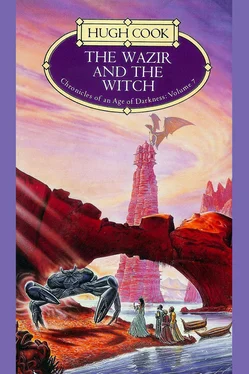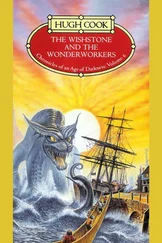Hugh Cook - The Wazir and the Witch
Здесь есть возможность читать онлайн «Hugh Cook - The Wazir and the Witch» весь текст электронной книги совершенно бесплатно (целиком полную версию без сокращений). В некоторых случаях можно слушать аудио, скачать через торрент в формате fb2 и присутствует краткое содержание. Жанр: Фэнтези, на английском языке. Описание произведения, (предисловие) а так же отзывы посетителей доступны на портале библиотеки ЛибКат.
- Название:The Wazir and the Witch
- Автор:
- Жанр:
- Год:неизвестен
- ISBN:нет данных
- Рейтинг книги:5 / 5. Голосов: 1
-
Избранное:Добавить в избранное
- Отзывы:
-
Ваша оценка:
- 100
- 1
- 2
- 3
- 4
- 5
The Wazir and the Witch: краткое содержание, описание и аннотация
Предлагаем к чтению аннотацию, описание, краткое содержание или предисловие (зависит от того, что написал сам автор книги «The Wazir and the Witch»). Если вы не нашли необходимую информацию о книге — напишите в комментариях, мы постараемся отыскать её.
The Wazir and the Witch — читать онлайн бесплатно полную книгу (весь текст) целиком
Ниже представлен текст книги, разбитый по страницам. Система сохранения места последней прочитанной страницы, позволяет с удобством читать онлайн бесплатно книгу «The Wazir and the Witch», без необходимости каждый раз заново искать на чём Вы остановились. Поставьте закладку, и сможете в любой момент перейти на страницу, на которой закончили чтение.
Интервал:
Закладка:
‘And rain and water were one, and their taste was that of blood.
‘And the world which was Woman was weak and in its weakness knew not of itself. It was soft; it was liquid; a great streaming surged within its depths, and it was void of form and of boundary.
‘Then Zoz spake out of nothing, saying unto Woman: I am.
‘Thus the will.
‘Thus the first Act, and the first Act was of pure will.
‘Then Act became Man, and a great light was upon him and within him, and his first name was Order.
‘And Woman beheld the light and said unto it: Come, be with me and of me.
‘But Zoz said unto the temptations of this moist engulfment: I am Light, thou art Dark. I am Law, thou art Panic. Behold me in my glory, and obey.
‘Thus spoke Zoz.
‘But woman obeyed not. She laughed.
‘And Zoz the Ancestral saw that the laughter was a great wrong against the right, and did unto Woman what it was his will to do, and afterwards there was silence without laughter, and a great contentment was within the heart of Zoz.
‘Thus it was at the time of the Coming.
‘As it should be and will be here and hereafter. For Zoz is great, and we ourselves can be great in Zoz. Can be and will be. Affirm!’
Thus Ek, and the affirmation of his congregation was like unto the rage of a great storm.
Reports of these speeches reached Pelagius Zozimus on the island of Jod. Now Pelagius Zozimus was in some ways a consummate politician, and thanks to his skills he had risen high in the ranks of Argan’s Confederation; but his politics were those of a bureaucrat. He was an accomplished tactician and a sly strategist who had won many triumphs in the realms of committees and commissions of enquiry; but he had no sense whatsoever of the passions of the mob.
So, when Ek called for the people to worship the Powerful, Zozimus muttered that this was all nonsense.
‘It is sufficient to lead a moral life.’
So said Zozimus to the fruit salad (coconut, mango, papaya, cassana, watermelon and sea-cucumbers) which he had prepared for the Crab’s latest lunch. (A fruit salad is what he called it, though some pedants will object that a coconut is not a fruit and that a sea-cucumber is actually an animal.)
‘It is pointless,’ said Zozimus, ‘to adore Power merely because it is Power. Not one person in a thousand will pay heed to such nonsense.’
Thus Zozimus.
Sadly underestimating the potency of Ek’s doctrines and the strength of their mob appeal.
Why was a wizard as brilliant as Pelagius Zozimus so badly astray in his estimations of political reality? Perhaps his very intelligence limited his perceptions, for it kept him from empathizing with the inchoate yearnings of the mob. That and his possession of personal power.
Though Pelagius Zozimus had long ago abandoned the control of corpses for the delights of cookery, occult power yet remained to him. He was and would always be a wizard of the order of Xluzu, a wizard holding power in his own right without reference to any of his fellows. He experienced power as a shaping fire, a living force, an actual presence; as do the poets, through whom there flow the energies of language itself. While Zozimus had played politics in the great castles of Drangsturm, ‘play’ is indeed the operative word; he delighted in bureaucratic manoeuvrings just as Ivan Pokrov delighted in pure mathematics.
Here Zozimus displayed not a personal quirk but, rather, an attribute typical of his kind; and it is worth pursuing this matter at length, for it helps explain the curious incapacity of the territories ruled by Argan’s Confederation of Wizards; and to explain, too, the fact that the political influence of the sorcerers of Yestron is but modest though their individual powers be great.
Doubtless not all will be entranced by explanation given in such a sober fashion, by the results of the researches of scholarship set down in a forthright manner without embroidery of blood or flame. Those thus impatient (a majority, one fears) are therefore invited to skip to the start of the next chapter of this chronicle, where it may be that the record will delight them with a rape; or with a plundering of gold; or a building flung aloft (a mote at a time) by the raging flames of arson; or by a tsunami mounting from Moana to sweep across the Outer Reef, to swamp the sand incarnadine of Scimitar, to wreck the white marble of the Analytical Institute from its stance on Jod, and then to despoil the city shore.
Or perhaps at the start of that next chapter they will find the libidinous Princess Sabitha (Sabitha Winolathon Taskinjathura, scion of the great Ousompton Ling Ordway) in hot copulation with one of her seagoing friends; or the irresponsible Shabble, now a priest, accepting the priestly duty of marriage counselling, and thus engaged in dialoguing the intimacies of the sexual conduct of a beglamoured but embattled young couple.
History, as one of the wise has had occasion to remark, is very largely a record of war, rape, murder, slaughter, torture, treason, revolution and riot; for which the historian is often blamed, as if history would cease to be enacted were all its chroniclers to be slaughtered (a remedy which has actually been essayed on at least three separate occasions, and which has proved to be singularly ineffective as a remedy for the woes of humanity). It is one of the frustrations of the chronologer’s task that most readers of annals such as these (these readers being few to start with, for history has never had popular appeal) are drawn to such pages by a positive lust for bloodshed; and, lacking any desire to join the ranks of the illuminati, have scant appetite for the scholarly conclusions which cast light on the Causes and the Processes of such disasters.
Scholarly conclusions now follow.
So:
Fly! Away! Let youth depart and race by a flicker of pages to the start of the next chapter, there to be gratified (perhaps) by tsunami, blasphemy or blatant copulation (or, then again, perhaps not).
And now, secure in the company of hoar age and toothless wisdom alone, let us proceed to show why Pelagius Zozimus was not constitutionally equipped to understand the temperament of the mob; and why, too, the political achievements of wizards and wonderworkers alike fall short of their potential.
As poets in committed combination are rare, so too are wizards; and for similar reasons. Any one great poet would remain great — as would any one great wizard — were all his fellows to disappear from the world in a great disaster. Hence most poets (and a great many wizards) secretly yearn for such a catastrophe. Much would be lost, but personal power would be enhanced by the lack of competition.
Compare this to the state of a soldier, be he of any rank from common muck-slugger to lordly general.
What is he on his own?
Nothing.
Can he rape, rob and pillage on his own?
Not effectively, for any washerwoman with a pitchfork in her hands can put him to flight.
Can he storm towns, sack castles, beseige cities, dare his desires across the seas or fortify his possession of ill-gotten treasures on his own?
The answer:
No.
Whereas wizard and poet alike can in solitude and with the self alone conspire to create instruments of temporal power (and in isolation consummate such conspiracy), no such ability is granted unto the ordinary run of mortals; wherefrom it follows that ordinary mortals must like the ants unite for cohesive action in the face of their individual impotence.
Ants engrossed in the multitude of their fellows partake of a power which would be alien to their existence were they to live alone; and so it is with most humans. As the antheap to the ant, so stands the State to the common citizen; and so like an ant the citizen submits to the oppressions of laborious routine, of claustrophobic discipline, and of war.
Читать дальшеИнтервал:
Закладка:
Похожие книги на «The Wazir and the Witch»
Представляем Вашему вниманию похожие книги на «The Wazir and the Witch» списком для выбора. Мы отобрали схожую по названию и смыслу литературу в надежде предоставить читателям больше вариантов отыскать новые, интересные, ещё непрочитанные произведения.
Обсуждение, отзывы о книге «The Wazir and the Witch» и просто собственные мнения читателей. Оставьте ваши комментарии, напишите, что Вы думаете о произведении, его смысле или главных героях. Укажите что конкретно понравилось, а что нет, и почему Вы так считаете.












